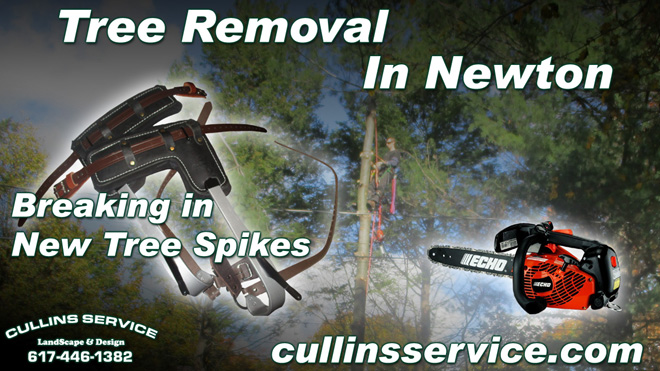
How to DIY Winterize / Store your Turf Beast Walk Behind Lawn Mower for the winter. How to Do It Yourself
What You will need
- -Lawn Mower
- -Motor Oil
- -Gras / Grease Gun
- -Drain pan
- -Funnel
- -Rags
- -Scraper - Brush - Hose - Air Compressor
- -Socket Wrench w/ Sockets and Torx Bit Socket
- -Oil Filter Wrench
- -Jack Stands
- -Two (2) 15/16” box end wrenches
- -Air Filter
- -Oil Filter
- -Fuel Filter
- -Spark Plugs
- -Fuel Stabilizer
- -Fresh Gas (No more than 1-2 weeks old)
- -Wrench
Not all Lawn Mowers are the same. This is for the Turf Beast 36 inch Walk Behind. Having said that you can pretty much apply this DIY Winterize / Store for Winter project to any Walk Behind Lawn Mower.
Move the Lawn mower to a flat surface.
You will need sockets and torx Bit sockets of varying sizes for the spark plug, Lawn Mower Blade and oil drain plug.
To lift the Walk behind you will need jack stands or something sturdy to support the machine
Oil filters, spark plugs, air filters and fuel filters will vary or may not apply to the Lawn Mower you are winterizing / storing for the winter.
The Turf Beast 36 inch Walk Behind does have an oil filter. So you will need an oil filter wrench.
Check your manual or parts store to find the right air filter, oil filter, fuel filter and spark plugs.
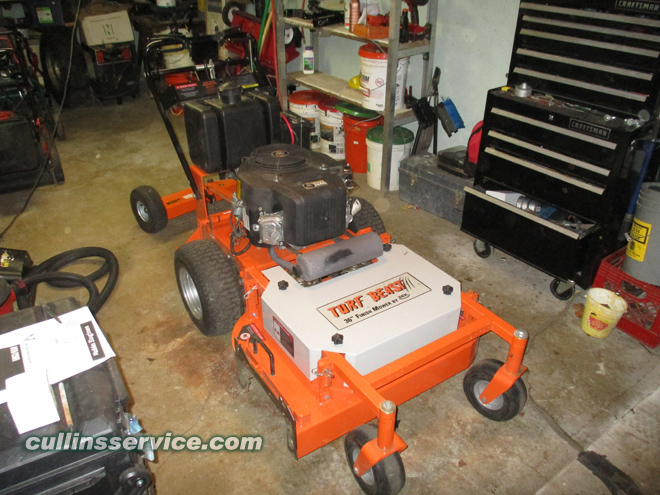
Remove Gas
Before you start winterizing / Storing your Lawn mower you are going to remove the gas / fuel from the Lawn Mower.
Siphon the fuel out of the tank into an approved gasoline container.
Run Engine
It's best to run the Lawn Mower for a few minutes before you start.
It will empty out the rest of the gas and warm the oil so it flows out easier when you change the oil.
Draining the oil when it's warm will carry off many floating particles that would otherwise settle in the engine.
Safety First
Before you start winterizing / Storing your Lawn mower you need to take precautions to keep you safe.
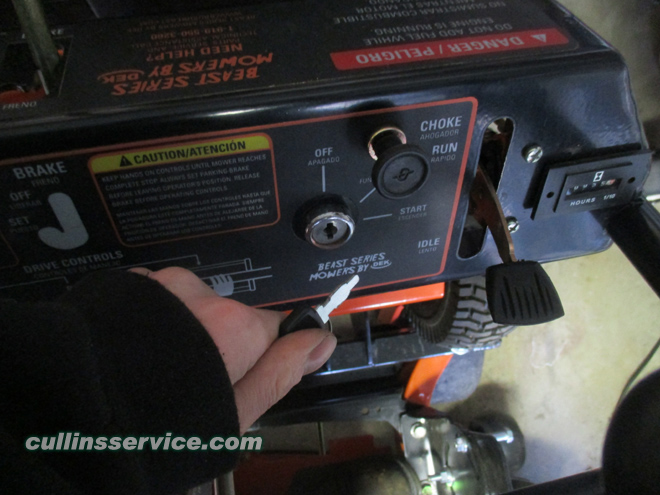
Remove Key
Remove the key from the ignition
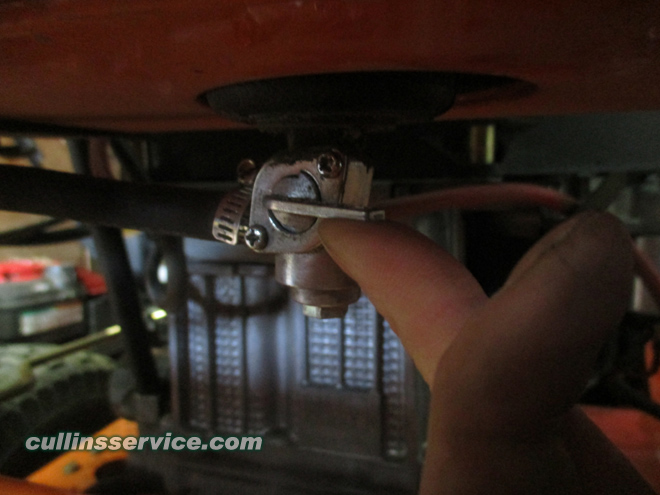
Shut Off Fuel
Under the gas tank there is a fuel shut off valve. Turn the switch to the off position.
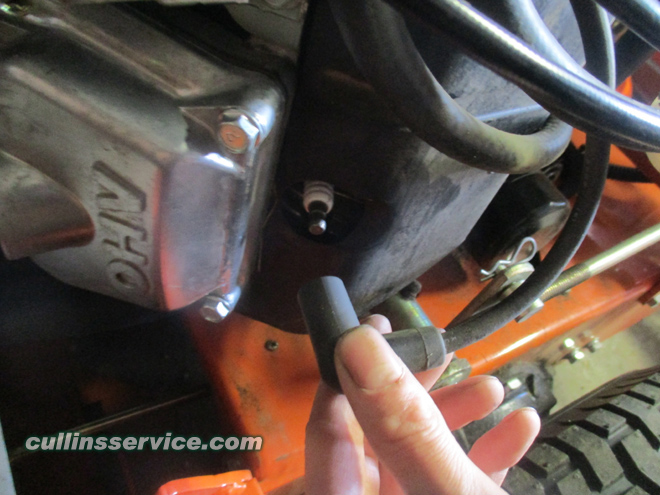
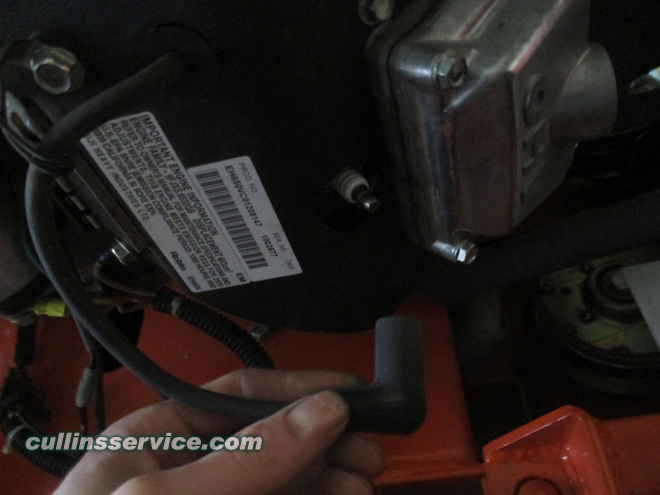
Remove Spark Plug Caps
Before doing any work make certain the blade and all moving parts have stopped.
Disconnect spark plug boots from spark plugs to prevent unintended starting.
The Spark plugs are on both sides of the Walk Behind Lawn Mower
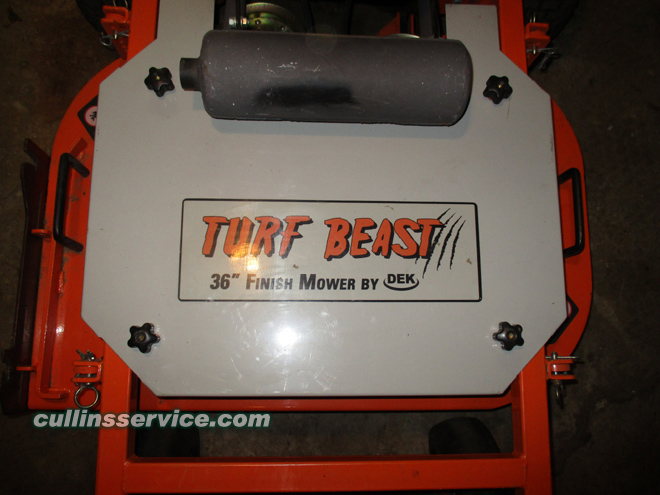
Clean Lawn Mower
You can use a brush, rag, warm water, air compressor or anything that wont scratch or destroy your lawn Mower. Clean dirt, dust, grass or any other debris that is on or has accumulated on your Lawn Mower. Keep your lawn mower clean to extend it's life.
Clean engine regularly with a cloth or brush. Keep the top of the engine clean to permit proper air circulation. Remove all grass, dirt, and combustible debris from muffler area.
Check Bolts and Damaged Parts
Look for signs of damage or excessive wear.
Check the tightness of all nuts, bolts, pins, and screws.
Tighten any that may be loose and replace any that are missing.
Change Oil
Check manuals for which motor oil to use and how much oil to put into the engine. Dispose of your oil in the right way. Bring it to your local dump or an auto parts store. Check the regulations in your area.
When you pour new oil into the crankcase, it's a clear golden color. Over time, the heat, dirt particles and air in the crankcase cause the oil to darken. Dark oil is not only dirty it also looses most of its ability to coat and protect engine components.
Manufacturers recommend changing the oil in your small engine after every 25 hours of operation. For a new engine, you will need to change the oil after the first five hours of operation. New engines require this to flush out small particles that accumulate naturally during the break-in period. Hours of use are just one factor in determining how often the oil should be changed. The amount of wear and tear is equally important. If your Walk Behind Lawn Mower is operated in dirty or dusty conditions or at high speeds, the oil in a Walk Behind lawn mower will break down faster under tough conditions. Wet grass, heavy dust, high temperatures and rough or hilly terrain are examples of tough conditions.
Avoid overfilling your crankcase. Too much oil can cause the same type of engine damage as not having enough. Air bubbles form in the oil, reducing overall lubrication. The resulting friction and metal-to-metal contact can cause premature part failure. Excess oil can also burn in the cylinder, producing smoke and leaving carbon deposits.
Make it a habit to check the oil level and appearance each time you're about to start your Lawn Mower. Checking the oil while the engine is cold and most of the oil is in the crankcase will show the most accurate reading. You will ensure a better-running engine and avoid problems down the road if you keep the crankcase full and change the oil on schedule and any time the oil loses its amber hue.
Unscrew Oil Cap
The oil cap is on top of the lawn mower connected to the dip stick.
This is were we are going to fill with oil.
Unscrew the cap. This will let the oil flow out easier.
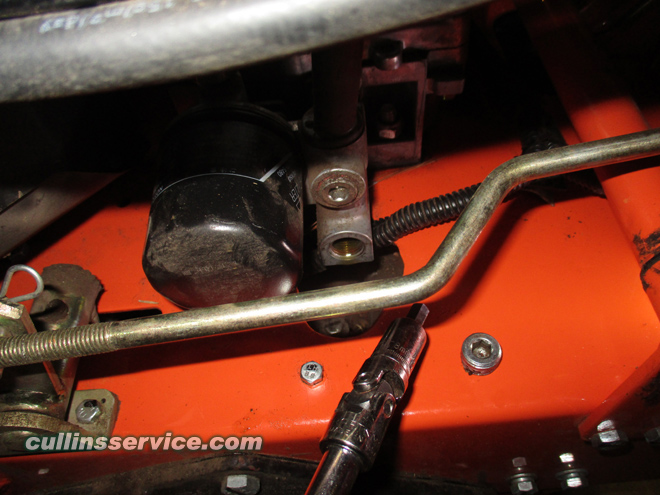
Remove Oil Drain Plug
Use a torx bit and remove the oil drain plug. It's located on the side next to the oil filter.

Drain Oil into Drain pan
Position the oil drain pan under the oil drain.
I use a narrow funnel to help get the oil into the oil pan through the small hole under the oil drain.
Make sure the oil is draining into the drain pan.
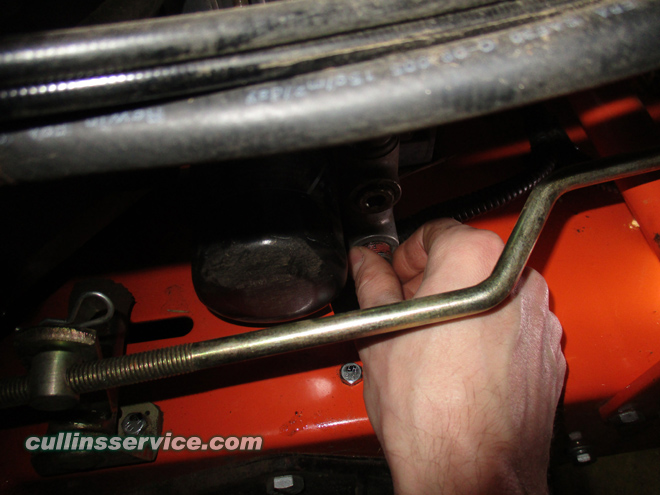
Reinstall Oil Drain Plug
When the oil is finished draining reinstall the oil drain plug.
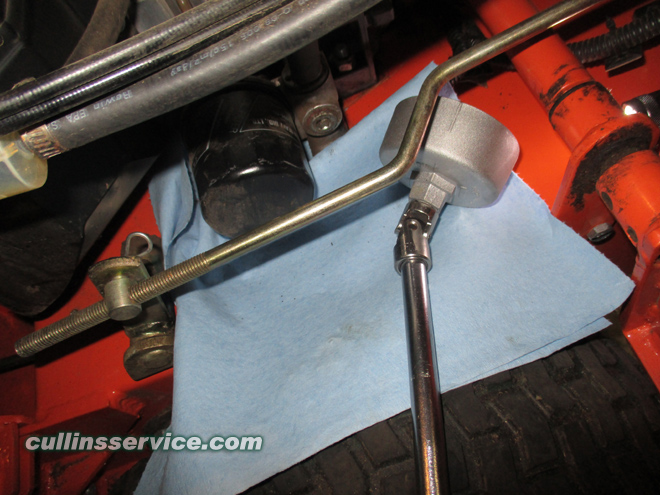
Remove Oil Filter
Use an Oil Filter Wrench to remove the oil filter.
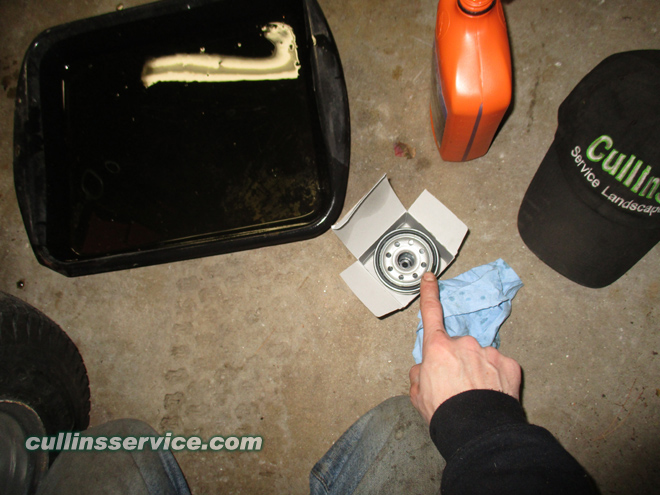
Oil Filter Seal
Wipe some new oil around the seal of the oil filter gasket.
This will give it a better seal.
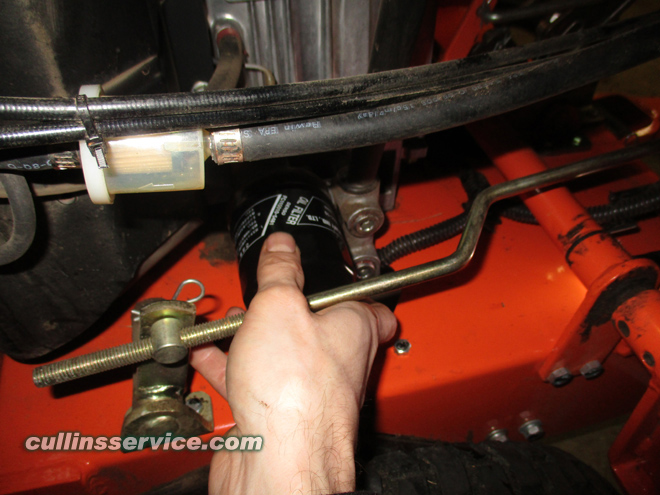
Install Oil Filter
Screw on new oil filter and hand tighten.
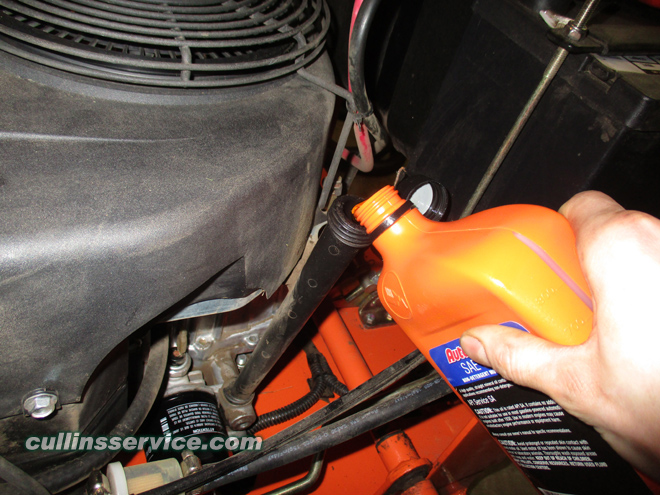
Fill Oil
see your Operator's Manual for the correct type of oil and the right amount.
Then fill er' up.
Put Oil Cap Back On
Make sure the dipstick is clean and screw the oil cap back on.
Start Mower
If you were just giving a regular oil change this would be were you start your lawn mower.
Seeing we are also winterizing / storing the lawn mower there is no gas in your lawn mower.
Wait until we run the Lawn mower with fuel stabilizer to do this step.
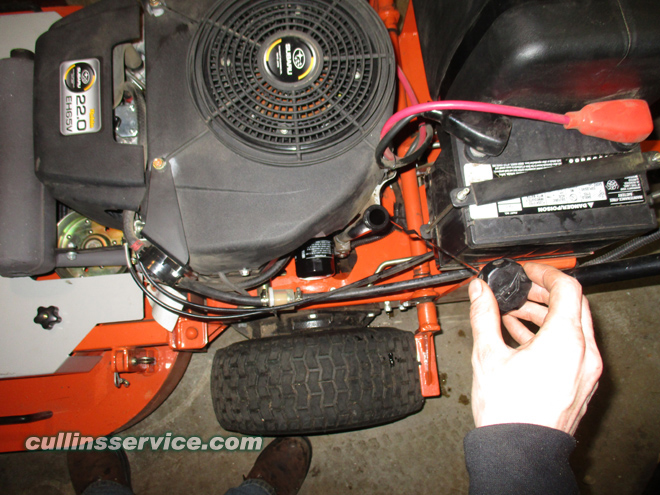
Check Oil Level
After you let the lawn mower run for a minute stop and pull out the dipstick. check to make sure it is at the correct mark. This should be visible on the dipstick. Fill or drain until it reaches the right level.
Check Lawn Mower Blades and Clean Deck
When removing the cutting blade for sharpening or replacement, protect your hands with a pair of heavy gloves.
Use a heavy rag or piece of wood to hold the blade.
Periodically inspect the lawn mower blades for cracks, especially if you strike a foreign object.
Replace when necessary.
Broken, dull and damaged lawn mower blades can cause a number of problems. Damaged or unbalanced lawn mower blades can cause excessive vibration in the mower.
Dull lawn mower blades usually get noticed by ripped blades of grass turning brown and irregular patterns they make in the lawn.
Lawn mower blades should be sharpened several times to extend their life and ensure that your grass gets a healthy cut, but they can only be filed so many times before a blade replacement is necessary.
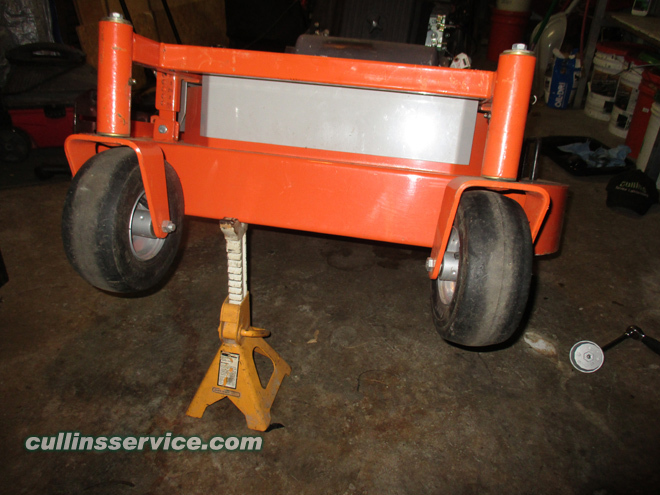
Lift the Deck
You are going to have to lift up the deck in order to check / remove the blades and clean the deck
I use jack stands.
I've seen people use 5 gallon buckets.
Make sure whichever way you choose it's safe and secure.
You don't want the deck to come crashing down on you.
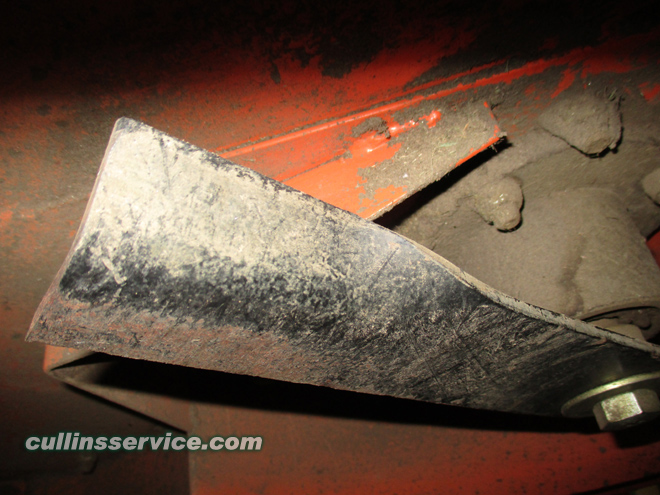
Remove Lawn Mower Blade
CAUTION! Beware of the cutting edges on the blades.
The rotation of one blade may cause the other blade(s) to rotate.
Always wear work gloves when handling blades.
Park the mower on level ground and block the rear wheels to prevent accidental rollback.
Raise the front end of the mower using a jack stand.
Use one wrench to loosen the top nut while holding the bottom bolt with the other wrench.
Slide the blade bolt down through the mower deck and out.
You will also have to remove the deck cover see Remove Deck Cover
Inspect Lawn Mower Blade
Inspect the blade.
It is important to look for dull edges and large chips or dents in the cutting edge.
Pay attention to the thickness of your lawn mower blade. Over time, sand, dirt, and other yard debris can erode the blade, causing the metal to weaken and become thin.
Clean Deck
While your Lawn mower is in this position, it is a good idea to get in there and scrape or brush any built up debris under the deck.
Your mower's deck may be equipped with a water port on its surface as part of its deck wash system.
Use the deck wash to rinse grass clippings from the deck's underside and prevent the buildup of corrosive chemicals.
-Push the mower to a level, clear spot on your lawn, near enough for your garden hose to reach.
-Make certain the mower's discharge chute is directed AWAY from your house, garage, parked cars, etc.
-Thread the hose coupler (packaged with your mower's Operator's Manual) onto the end of your garden hose.
-Attach the hose coupler to the water port on your deck's surface.
Lubricate Blade Bolt
Lubricate the blade bolt with light oil.
I use engine oil.
You can use any light oil you like.
Reinstall Lawn Mower Blade
Insert the blade bolt through the cutting deck.
Install the blade spacers that were removed, back onto the blade bolt followed by the nut and tighten.
IMPORTANT: The number of spacers should always be the same on each blade bolt.
NEVER put the spacers below the blade.
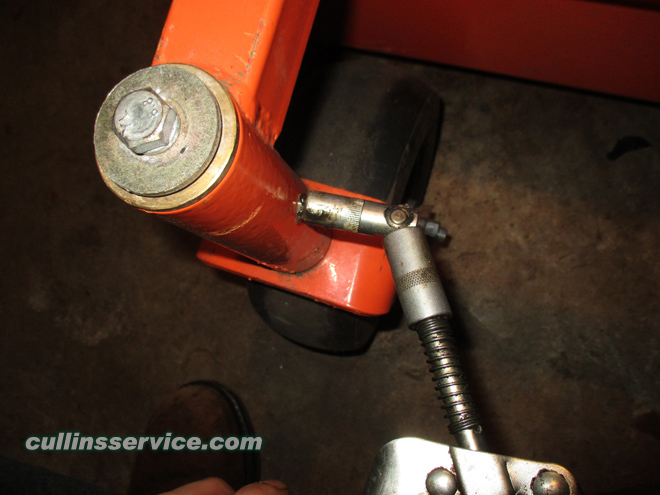
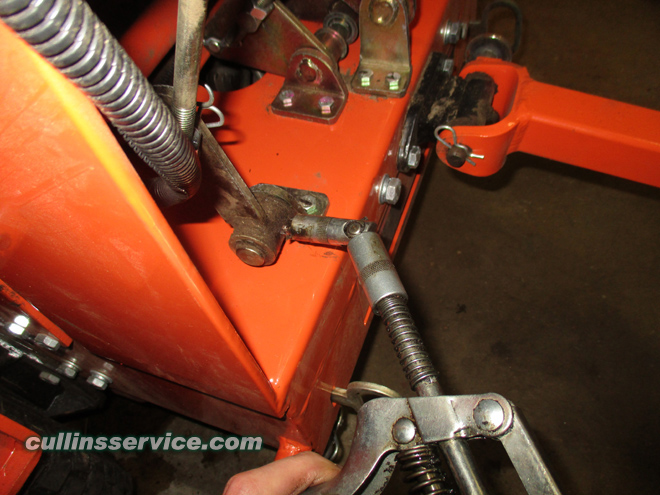
Lubricate / Grease
Locate the grease points on your walk behind lawn mower (Check the owner manual The 36-inch mowers have 10 lubrication points.). Attach the grease gun to the grease nipples and insert grease.
Lubricate pivot points or moving parts on the Walk behind lawn mower at least once a season with light oil.
This pivot points or moving parts must operate freely.
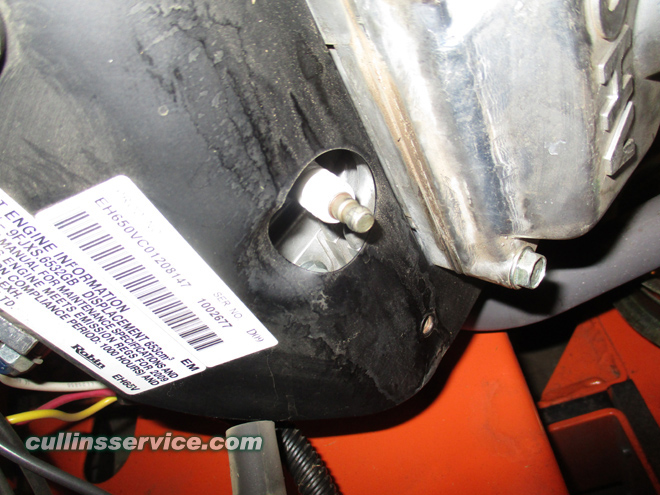
Spark plug
Replace or Clean spark plugs and reset the gap once a season.
Spark plug replacement is recommended at the start of each mowing season.
Check engine manual for correct plug type and gap specifications.
You will need to get the right size socket and a socket wrench.
Unscrew the spark plug and screw it back in when you are finished.
Air Filter
Service air cleaner every 8 hours under normal conditions.
Clean every few hours under extremely dusty conditions.
Poor engine performance and flooding usually indicates that the air cleaner should be cleaned or replaced.
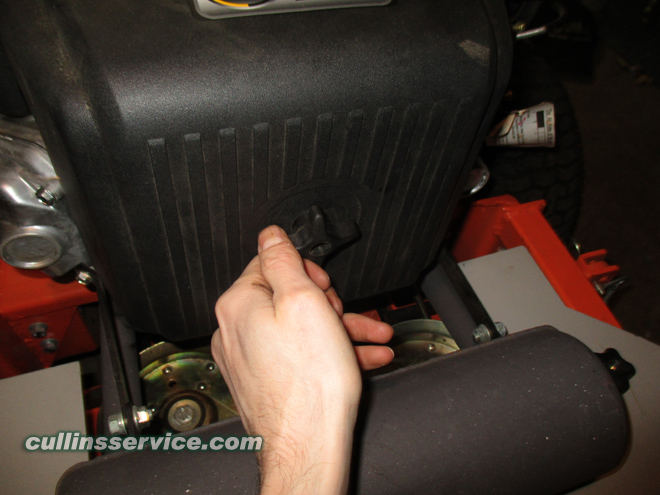
Remove Air Filter Housing
Locate the air filter housing.
The Turf Beast Walk-Behind lawn mower has one screw holding the air filter housing on.
Remove the screw and pull off air filter housing.
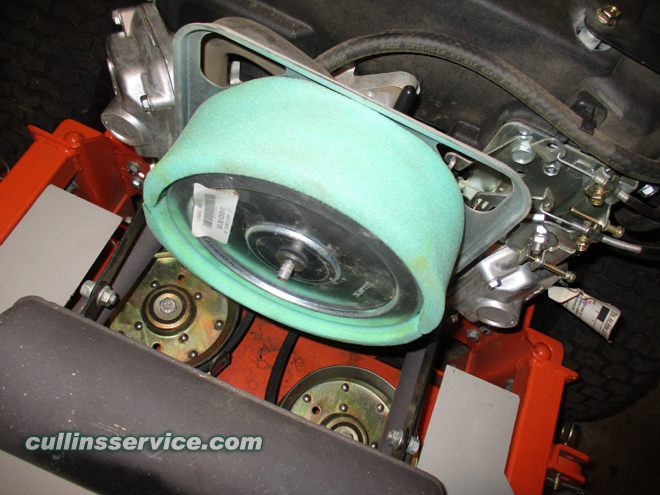
Remove Air Filter Foam Cover
Once the Housing is off remove the foam cover on the air filter.
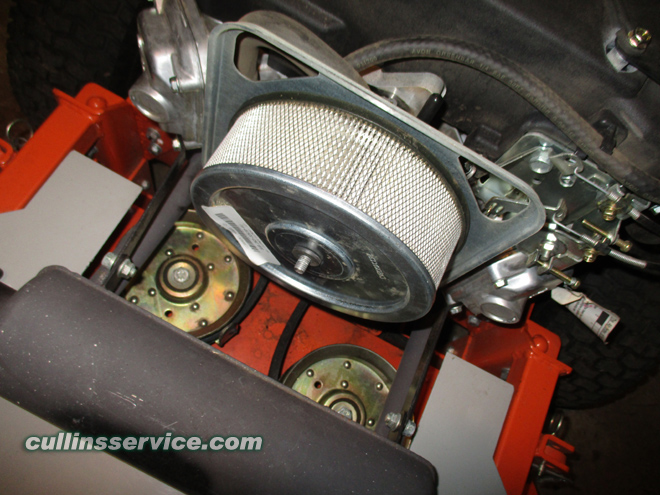
Remove Air Filter
Remove the air filter from engine.
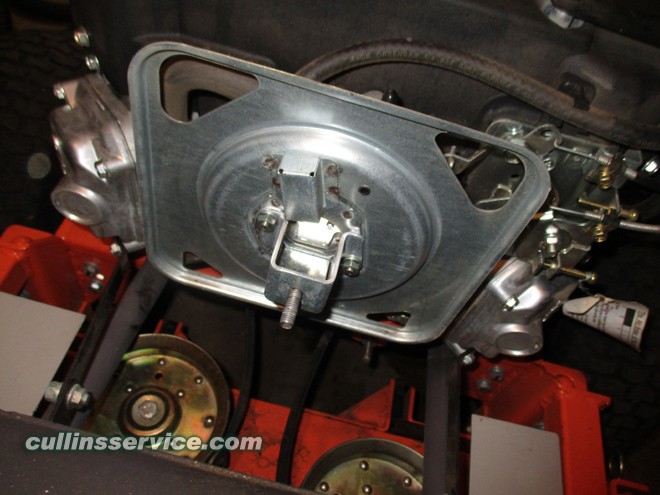
Clean Carburetor Port
Spray carburetor cleaner in and around the carburetor port.
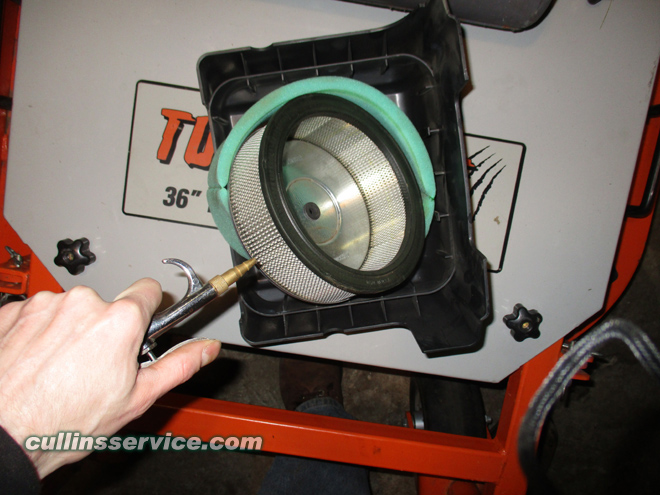
Inspect Air Filter
Inspect the air filter foam cover and the air filter itself
If the foam cover or air filter are in bad shape replace them. (check the owners manual or local parts store for air filter)
If they are ok just clean them out.
Clean the foam cover with a compressor by blowing it out or wash it w/ warm water.
Using a compressor blow out the air filter.
Reverse the process to reinstall the air filter assembly.
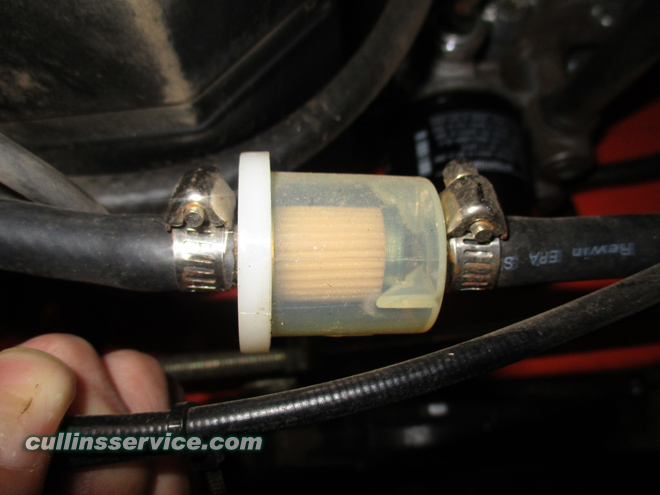
Fuel Filter
Replace fuel filter every 100 hours (Check engine manual for correct fuel filer.)
Inspect the fuel filer.
Check for particles and damage.
To Replace unscrew the hose clamps and remove.
Install new fuel filter and tighten hose clamps
Check Belts and Pulleys
The belts and pulleys are crucial in making your walk behind lawn mower useful.
Not just a pretty lawn ornament.
You should always have a spare belt and proper tools when on a job.
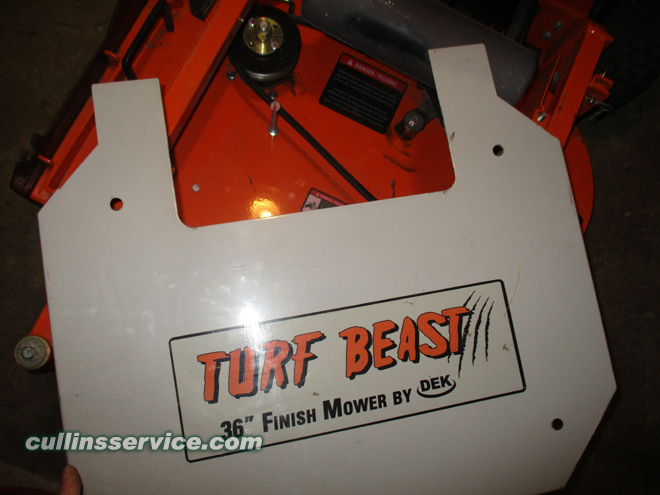
Remove Deck Cover
Remove the four screws from the corners of the cover.
Remove cover and set aside
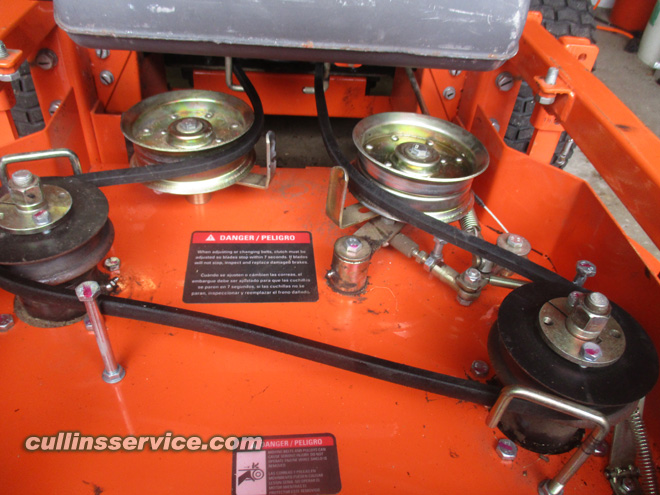
Inspect Belts and Pulleys
Inspect (adjust if needed)
Break-in (first 5 hrs) and Every 8 hrs after
Check for damage and tightness.
Make sure that no metal has been touching the pulleys.
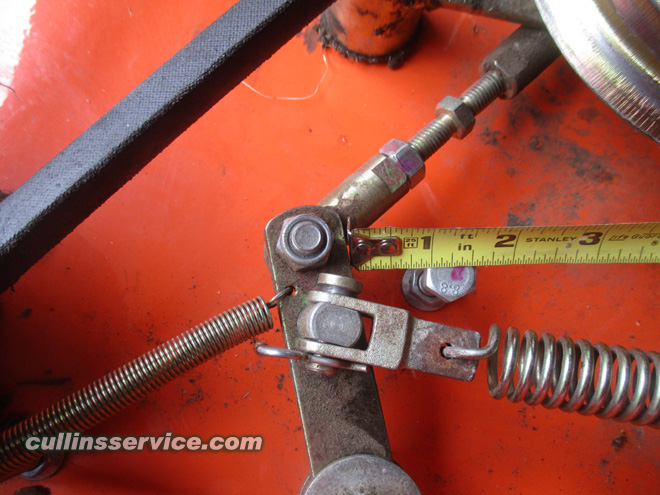
Check the Linkage
The linkage should stop approximately 1 inch before contacting the stop bolt.
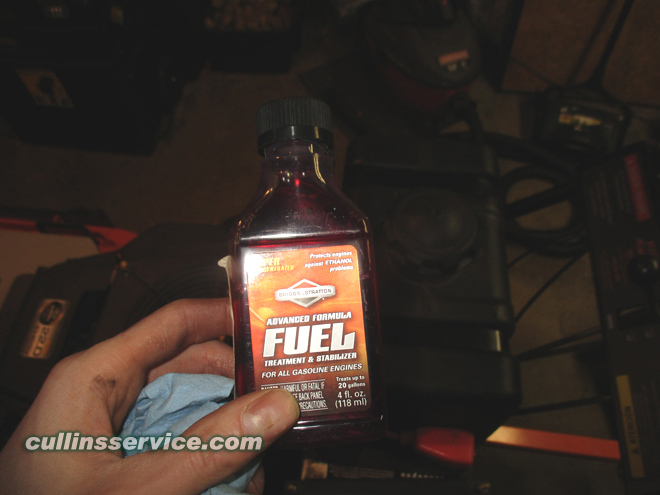
Fuel Stabilizer
I am using Briggs and Stratton Fuel Stabilizer. You can use any Fuel Stabilizer you like.
Fuel Stabilizer stop the harmful effects associated with ethanol blends, which account for nearly 90% of all fuel sold in the U.S.
Ethanol-blended gas is especially prone to deterioration, leading to rust in the fuel tank, corrosion, gum build-up, and even severe engine damage.
This is reflected in performance, yielding starting issues and rough running.
Here's why:
-Ethanol-based fuels attract moisture, which eventually separates from the fuel
-A layer of ethanol-enriched water forms at the bottom of the tank, which is highly corrosive for engine parts
-Gum and varnish forms as the fuel breaks down, resulting in stuck intake valves, clogged fuel lines and carburetor jets
-Fuel can go stale in 30 days or less
Benefits of Fuel Stabilizer for Small Engines
-Protect Engines Against Ethanol Triple Antioxidant
-Dual corrosion inhibitors guard metal engine parts against corrosion
-Metal De-Activator stops chemical reactions caused by dissolved metals in fuel
-Detergent ingredients prevent gum and varnish build-up on engine parts
-Water Protection inhibitors protect against the harmful effects of water in fuel due to ethanol
Add Stabilizer
Add fuel treatment according to instructions.
If gasoline in the small engine has not been treated with a fuel stabilizer, it must be drained into an approved container.
Run the engine until it stops from lack of fuel.
The use of a fuel stabilizer in the storage container is recommended to maintain freshness.
It is also recommended that fuel is purchased in quantities that can be used within 30 days.
This will assure fuel freshness and volatility tailored to the season.
You can add the fuel stabilizer in a gas can to use in multiple engines.
You can add fuel stabilizer directly to the gas tank.
Run Lawn Mower
Run engine for 2 minutes to circulate stabilizer through the fuel system.
After you run the lawn mower check to make sure the oil level is good.
You should also check for leaks on the engine.
Make sure there are no vibrations coming from the deck. Which could be caused by an unbalanced lawn mower blade.
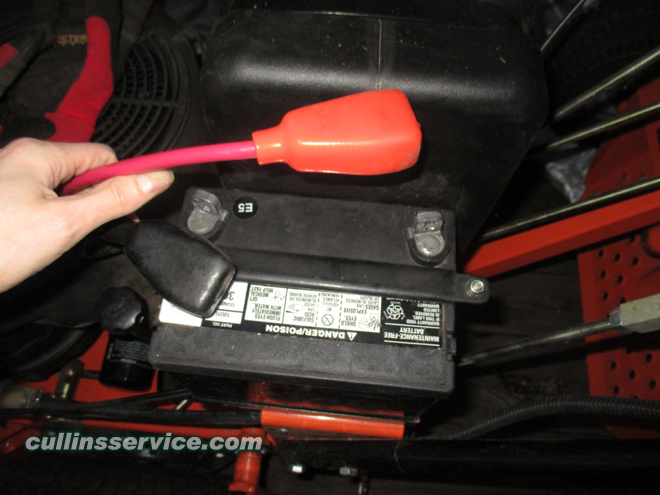
Remove Battery
Remove your lawn mower battery.
Disconnect the battery cable from the battery, starting with the negative cable (look for the minus sign).
Release the battery from the strap holding it down.
Remove the battery and wipe it off with a cloth.
Clean the battery terminal using a wire brush.
Store it in a cool, dry place.
Store it away from gas cans, the water heater or furnace.

Close Fuel Valve
Turn the fuel vale to the off position
Finished
Store mower in a dry, clean area.
Do not store next to corrosive materials, such as fertilizer.
When storing any type of power equipment in a poorly ventilated or metal storage shed, care should be taken to rust-proof the equipment.
Using a light oil or silicone, coat the equipment, especially cables and all moving parts of your lawn mower before storage.
Watch Video
If you prefer to watch the video on this DIY How to winterize / store your Walk Behind Lawn Mower check out our video.
Subscribe to our channel for more DIY How to videos.
See Blog Entry







